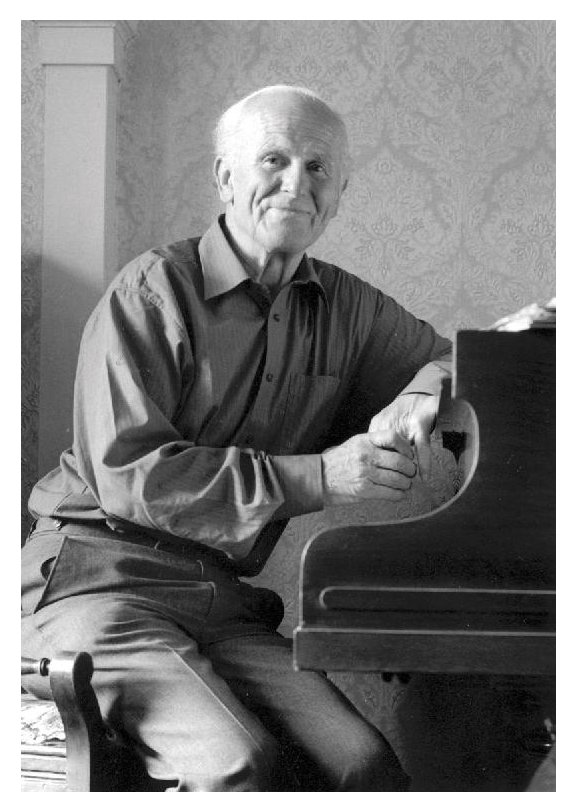

|
Sir David Willcocks
Born: December 30, 1919 - Newquay, Cornwall, England The English conductor, organist and music educator, Sir David Willcocks, began his musical training as a chorister at Westminster Abbey from 1929 to 1934. He was a music scholar at Clifton College, Bristol (1934-1938), and then the organ scholar at King’s College, Cambridge (1939-1940). Following a five-year period of war military service, in which he was awarded the Military Cross, he returned to King’s College for two years (1945-1947). He was elected a Fellow of King's College, Cambridge, and appointed Conductor of the Cambridge Philharmonic Society. From 1947 to 1950 David Willcocks was the organist at Salisbury Cathedral and from 1950 to 1957 at Worcester Cathedral. During his years at Worcester he was principal conductor of the Three Choirs Festival (1951, 1954 and 1957) and conductor of the City of Birmingham Choir (1950-1957), with whom he gave his first British performance of Maurice Duruflé’s Requiem in 1952. From 1956 to 1974 he was also conductor of the Bradford Festival Choral Society. From 1957 to 1974 he was Director of Music at King’s College, Cambridge, where he maintained the glorious tradition with distinction. He made numerous recordings that gained international popularity through television and radio. With King's College Choir Cambridge he gave concerts in many European countries, Canada and Africa. At Cambridge he also served as University Organist, University Lecturer and Conductor of the Cambridge University Musical Society. From 1960 to 1998 he was Musical Director of The Bach Choir (London) which, since its foundation in 1875, has given first performances of several important works. With The Bach Choir, Sir David Willcocks gave the first performances in Italy of Benjamin Britten’s War Requiem at Perugia, Milan, La Scala and Venice in 1963 and later introduced the work in Japan, Hong Kong, Portugal and the Netherlands. From 1974 to 1984 he was Director of the Royal College of Music in London. He appears frequently as a conductor in the USA, Canada and European countries. He has also paid many visits to New Zealand and Australia, giving concerts with the New Zealand Symphony Orchestra and Orchestras of the Australia Broadcasting Corporation; to Hong Kong for concerts with the Hong Kong Symphony Orchestra and to South Africa for concerts with the South African Broadcasting Corporation Choirs and Orchestra. David Willcocks was made Commander of the Order of the British Empire in 1971, and was Knighted in 1977 in the Queen's Silver Jubilee Honours List. He is currently Music Director Emeritus of King's College Choir Cambridge. Sir David has received honorary degrees in England from the Universities of Bradford, Bristol, Exeter, Leicester and Sussex, and from the Royal College of Music in London; in the USA from Luther College (Iowa), St. Olaf College (Minnesota) and Westminster Choir College (New Jersey); and in Canada from the Universities of Trinity, Toronto and Victoria B.C. He is an Honorary Fellow of King’s College, Cambridge. He served as general editor of the Church Music series of the Oxford University Press. |
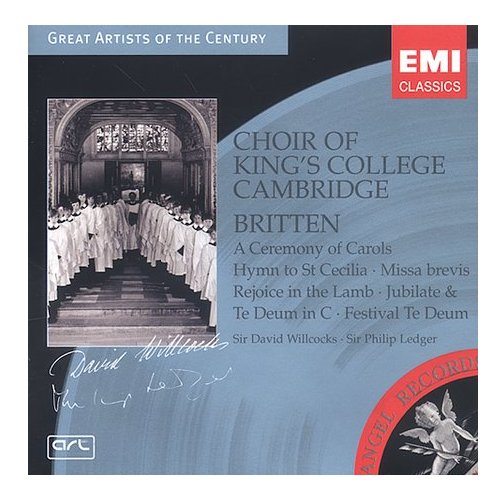 Sir David: We have lost a
certain amount through these mechanical contrivances with which we’re
surrounded, but I hope that that could be something temporary and that
people will get back to the idea that they’ve got to make music
themselves to get the fullest joy out of music.
Sir David: We have lost a
certain amount through these mechanical contrivances with which we’re
surrounded, but I hope that that could be something temporary and that
people will get back to the idea that they’ve got to make music
themselves to get the fullest joy out of music.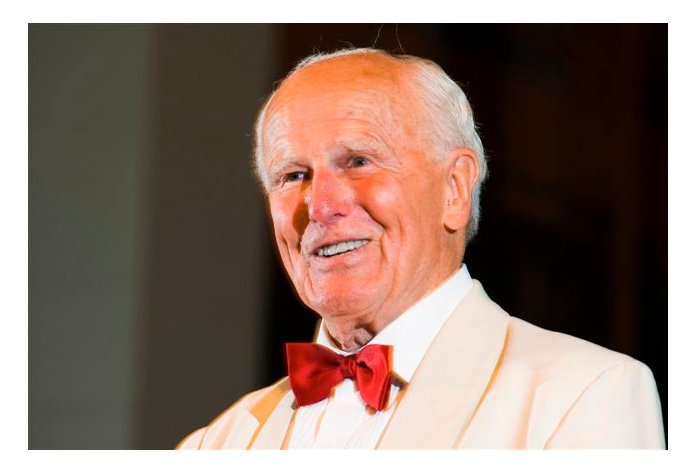 Sir David:
Exactly. In a string quartet, if the first violin has the melody
it will have an expressive character all of its own, then if it shifts
suddenly to the viola, the violin should cease not only from the point
of view of dynamics, but the whole sound quality should change and the
viola should assert itself by expressive vibrato. Even within a
phrase, certain notes need more vibrato than others. I must say,
most of the faults which I’ve encountered with choirs have been through
excessive vibrato, and the singers have been unable to control it
adequately.
Sir David:
Exactly. In a string quartet, if the first violin has the melody
it will have an expressive character all of its own, then if it shifts
suddenly to the viola, the violin should cease not only from the point
of view of dynamics, but the whole sound quality should change and the
viola should assert itself by expressive vibrato. Even within a
phrase, certain notes need more vibrato than others. I must say,
most of the faults which I’ve encountered with choirs have been through
excessive vibrato, and the singers have been unable to control it
adequately.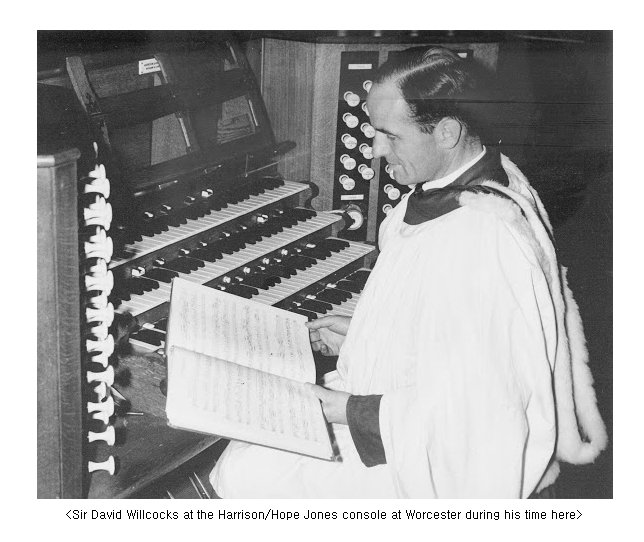 BD: But when you
were playing, did you conduct and play organ at the same time?
BD: But when you
were playing, did you conduct and play organ at the same time?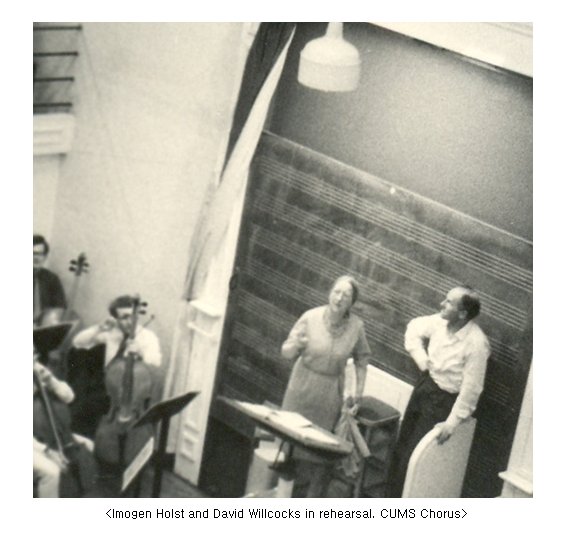 BD: It is certainly
a wonderful tradition!
BD: It is certainly
a wonderful tradition!This interview was recorded at his hotel in Evanston, IL, on
January 22,
1989. Segments were used (with recordings)
on WNIB the following week and again later that year, and also in 1994
and 1999. A copy of the unedited audio was placed in
the Archive of Contemporary Music at Northwestern University. The
transcription was made and posted on this
website in 2013.
To see a full list (with links) of interviews which have been transcribed and posted on this website, click here.
Award - winning broadcaster Bruce Duffie was with WNIB, Classical 97 in Chicago from 1975 until its final moment as a classical station in February of 2001. His interviews have also appeared in various magazines and journals since 1980, and he now continues his broadcast series on WNUR-FM, as well as on Contemporary Classical Internet Radio.
You are invited to visit his website for more information about his work, including selected transcripts of other interviews, plus a full list of his guests. He would also like to call your attention to the photos and information about his grandfather, who was a pioneer in the automotive field more than a century ago. You may also send him E-Mail with comments, questions and suggestions.